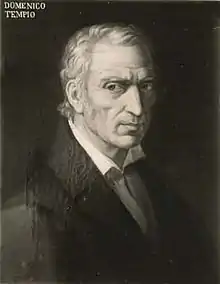Domenico Tempio
Domenico Tempio (1750–1821) was an Italian writer who mainly wrote in the Sicilian language or dialect. During his lifetime, he was considered a major poet, and was much praised, but after his death his work was largely forgotten, until a reawakening of interest following the second world war.[1] His poem La Caristia ("The famine"), describing a famine and rioting in Catania in 1797–98, is regarded as his major work.[2]
Domenico Tempio | |
|---|---|
 Portrait of Domenico Tempio by Giuseppe Gandolfo | |
| Born | August 22, 1750 Catania, Italy |
| Died | February 4, 1821 (aged 70) Catania, Italy |
| Language | Italian/Sicilian |
| Spouse | Francesca Longo |
| Children | one daughter |
Works
- Operi di Duminicu Tempiu catanisi (1814-1815) is a collection of his poetry, edited by Francesco Strano. The best-known poems are L'Odi l'Ignuranza Supra, The Maldicenza sconfitta, Veru Piaciri Lu, The Mbrugghereidi, The Numi Scerra di li, Lu cuntrastu allayed, Paci di Marcuni, Li and Li Pauni Nuzzi.
- La Caristia (1848), is his most important work, published posthumously by Vincenzo Percolla. It is a poem in twenty cantos.
- Tempio di Domenico Poesie (1874) is the second edition of his works, with many additions.
- Erotic poetry was collected in 1926 by Raffaele Corso Di Vincenzo and by Maria and Santo Cali in 1970.
References
- "Domenico Tempio in Enciclopedia di Catania, www.cormorano.net". Retrieved 23 January 2014.
- Tempio, Domenico (1 Oct 2010). Poems and fables. introduced and translated by Giovanna Summerfield. Legas. p. 17. ISBN 978-1-881901-68-6.
This article is issued from Wikipedia. The text is licensed under Creative Commons - Attribution - Sharealike. Additional terms may apply for the media files.